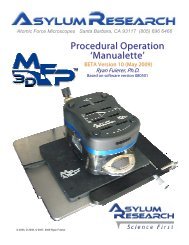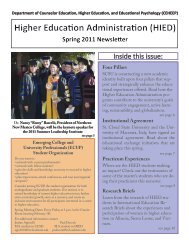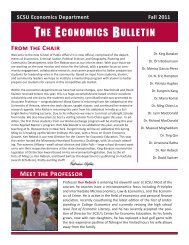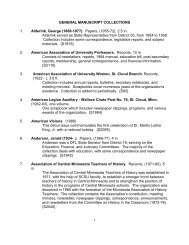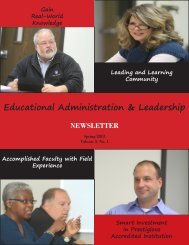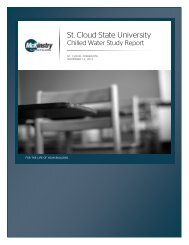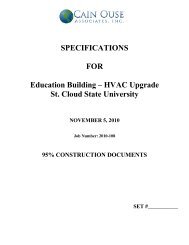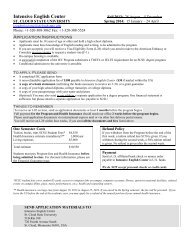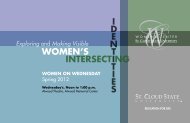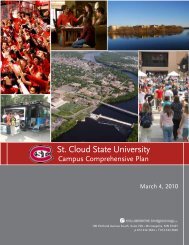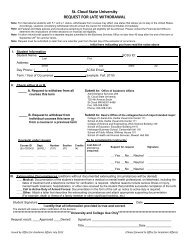2008 Proceedings - St. Cloud State University
2008 Proceedings - St. Cloud State University
2008 Proceedings - St. Cloud State University
You also want an ePaper? Increase the reach of your titles
YUMPU automatically turns print PDFs into web optimized ePapers that Google loves.
Abstracts<br />
Session A All Disciplines Ballroom<br />
Speech-Language Pathologists’ Perceptions of Multicultural Issues Affecting Service Delivery<br />
An emerging issue in the field of speech-language pathology is service delivery to individuals from culturally diverse backgrounds. Due to<br />
changes in the U.S. population, speech-language pathologists (SLPs) are serving more multicultural individuals. The purpose of this study<br />
was to find out what multicultural challenges are being faced by SLPs working in the clinical setting. Thirty-six SLPs from the upper<br />
Midwest who were working with clients in the educational or medical settings participated. Work experience ranged from 10 to 35 years.<br />
Open-ended interview questions and follow-up survey questions were administered to each participant. Responses to interview questions<br />
were categorized based on themes that emerged. Responses to survey questions were grouped as ―agree,‖ ―disagree,‖ ―neutral‖ and ―not<br />
applicable‖. For the open-ended interview question ―What has been the most challenging multicultural issue you have faced on the job?‖,<br />
five themes emerged: (1) Interpreter Challenges, (2) Client Challenges, (3) Professional Challenges, (4) Family Challenges, and (5)<br />
Cultural Difference Challenges. When asked what they had to learn over the past ten years in order to remain effective in their positions,<br />
many SLPs indicated they had to learn about working with English Language Learners (ELLs), interpreters, and about cultural diversity.<br />
Survey results indicated that half of the SLPs felt they received adequate training on multicultural issues. When asked about how many<br />
English Language Learners (ELLs) were on their caseloads, nearly all SLPs indicated that ELLs made up 25% or less. The results suggest<br />
that SLPs may need more training in the major issues affecting the implementation of effective service delivery. Of particular note is the<br />
area of working with interpreters. Although guidelines and strategies for working with interpreters are widely available to professionals, it is<br />
unclear if these are adequate to address the pressing needs of SLPs in the field.<br />
Presentation Index: A51<br />
Time: 9:00 a.m.<br />
Department: Communication Sciences and Disorders<br />
Project Sponsor(s):<br />
<strong>St</strong>udent Presenter(s): <strong>St</strong>arz, Kimberly<br />
Whites, Margery<br />
Factors Affecting the Use of Evidence-Based Practice by Speech-Language Pathologists<br />
The American Speech-Language-Hearing Association (Asha) promotes using Evidence Based Practice (EBP) as a vital part of providing<br />
the best service possible to clients and their caregivers. What is not clear, however, is how consistently speech-language pathologists<br />
(SLPs) are using EBP in their clinical work. A number of factors may affect its use, including workplace factors, SLP knowledge about EBP,<br />
and perceptions about rewards of using EBP as vital parts of their jobs. This study sought to find out (1) what SLPs perceive as rewards for<br />
using and consequences of not using EBP, (2) job factors that may affect the use of EBP by SLPs (e.g., financial incentives, supervisor<br />
factors – knowledge, requirements, performance appraisal, time, insurance reporting), and (3) what SLPs perceive as most helpful in<br />
increasing their knowledge and skills in EBP. The participants for this study included a random selection of 36 SLPs primarily from the<br />
Midwest; 23 worked in the school setting and 13 in the medical setting. Participants answered open-ended interview questions then<br />
completed surveys. The SLPs stated that the top reward for using EBP was client progress due to using effective therapy techniques. The<br />
number one job factor affecting the use of EBP is the lack of having sufficient time during the workday to do research on therapy programs.<br />
Most SLPs did not receive financial incentives for using EBP. The SLPs perceived that continuing education and collaboration with other<br />
SLPs were the most helpful factors in increasing knowledge and skills in EBP. Results suggest that a whole range of factors may affect<br />
the use of EBP on the job.<br />
Presentation Index: A52<br />
Time: 9:00 a.m.<br />
Department: Communication Sciences and Disorders<br />
Project Sponsor(s):<br />
<strong>St</strong>udent Presenter(s): Westling, Heather; Vandenheuvel, Laura; Perez, Nichole; Whites, Margery<br />
Braun, Laura<br />
Spatial Analysis of Historic Yellow Brick Houses in <strong>St</strong>. <strong>Cloud</strong><br />
A distinguishing characteristic of historic <strong>St</strong>. <strong>Cloud</strong> was the use of ―yellow‖ brick in residential and commercial buildings. By conducting a<br />
visible survey, this study located the existing yellow brick houses within a 1 mile radius of the <strong>St</strong>earns County Courthouse. Houses were<br />
classified into four categories by age, utilizing the Sanborn Fire Insurance Maps. Spatial patterns of these remaining unique yellow brick<br />
houses were identified and cartographically portrayed. Photographic examples of these categories are also presented. A review of<br />
literature and the records maintained at the <strong>St</strong>earns History Museum revealed that currently no maps exist, showing how few of these<br />
unique houses remain in <strong>St</strong>. <strong>Cloud</strong>. This research fills that gap.<br />
Presentation Index: A53<br />
Time: 9:00 a.m.<br />
Department: Geography<br />
Project Sponsor(s):<br />
<strong>St</strong>udent Presenter(s): Wixon, Erik<br />
John, Gareth<br />
<strong>St</strong>. <strong>Cloud</strong> <strong>St</strong>ate <strong>University</strong> <strong>St</strong>udent Research Colloquium 32<br />
April 22, <strong>2008</strong>



